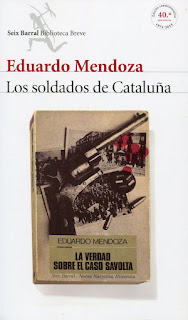Los soldados de Cataluña - Eduardo Mendoza
His first fictional novel sets the scene of that intriguing past at the beginning of the 20th century. On the 1st January 1918, businessman Enrique Savolta y Gallibos is assassinated during a high society gathering at his mansion. The first part of the novel gathers together a group of testimonies and newspaper articles written several years after the event, detailing events leading up to the 'Savolta Case'. There is unrest and protests on the streets, with Catalan separatists, workers, communists, socialists and union anarchists mobilising towards a strike, only for ten of their number to be beaten up on the streets. The second part of Los soldados de Cataluña deals in a more conventional, although slightly non-linear way with the aftermath.
Part one of the book has little narrative and most of it is around a social gathering between Señora Rosa Savolta and her friends. The majority of this section is laid out in a series of articles by Domingo Pajarito de Soto, a journalist for the workers paper La voz de Justicia and reports from the ex-Commissioner of Police, Don Alejandro Vásquez Ríos as well as the first person perspective of Javier Miranda, an employee of the lawyer Cortabanyes, representing the Savolta arms manufacturing company. Relating events in this section through a testimony before a US committee, Miranda explains how he came to be involved with a significant Frenchman, Lepprince, who has been introduced to the law firm making representations on behalf of the Savolta company.
One of Miranda's first tasks is to find the Voz de Justicia journalist for Lepprince and invite him to observe and report on the workings of the Savolta company. Despite fearing the motives behind it, a friendship grows between Miranda and Pajarito de Soto, and a love affair with his wife Teresa. His fears appear to have some foundation when the journalist is murdered and Miranda wants to know why. The authorities meanwhile see the city as a hotbed of revolutionaries, immigrants from other regions unhappy that things haven't worked out for them, and a recent import of anarchist activists ready to use them to achieve their aims. It is believed then that Savolta is shot in reprisal for the death of de Soto.
The first part of Los soldados de Cataluña is a period political thriller, lurching from scene to scene without warning to throw reader off guard and contrast situations across the political and social spectrum, but it's not without Mendoza's now well established sense of humour. You can even see some of the familiar character types in there, the innocent seeking justice caught up in a complex intrigue, the kind-hearted and harsh mouth prostitute, the well-meaning but incompetent authorities held back by outside forces. There is even a lunatic who is let out of an asylum, Nemesio Cabra Gómez, who just happens to know who killed de Soto and Savolta, but goes mad before he can reveal it to Commissioner Vásquez, who is also shipped off before he investigates too deeply.
Without the articles and testimonies, the second part of the novel is slightly more conventional as a narrative, but it blends several different threads and parallel timelines together. One timeline covering how Nemesio Cabra Gómez became involved covers events in the past up until they meet the 'present day'. Another strands cover Lepprince's political ambitions in high society, marrying Maria Rosa Savolta and campaigning to become major of the city, while Javier Miranda provides a first-person narrative on his continuing association with Lepprince and his unconventional marriage to Maria Coral, the gypsy dancer.
The writing is wonderful, using journalese, officialese, testimonials, recorded interviews, interweaving narrative, all manner of means and perspectives, and all of them are colourful and clever. It sounds complicated and haphazard, but it all ties together beautifully and is never difficult to follow. This debut novel from Mendoza is much more successful at combining the personal with the historical than El rey recibe, the opening book of his most recent trilogy. It's an essential element that along with his other work, adds up to a comprehensive view of people and society, particularly Cataluña, but also is a heartfelt expression of the desire to live and love freely from the injustice and inequality in society. a constant theme in Mendoza's work and one elaborated upon here wonderfully and entertainingly with the authors familiar style, humour and character.
Reading notes: I read an eBook copy of the 40th anniversary edition of Los soldados de Cataluña published by Seix Barral. Previously published as La verdad sobre el caso Savolta, it reverts here for the first time to the author's original title. Included in this edition are copies of original documentation of the censor's review of the book as a "novelón estúpido y confusa… típico de las novelas pésimas escritos por escritores que no saben escribir". A rather more thoughtful report for the Ministry of Information and Tourism recognises however that the city is the true protagonist of the work, with its complex make-up of humanity in those problematic years, in society as much as in the political arena, praising its rich characterisation, humour and irony. Other documents show that it passes censorship with the only recommendation being a change of a title "which relates in no way with the contents of the book", and some views and perspectives on the book from introductions to previous editions.




Comments
Post a Comment